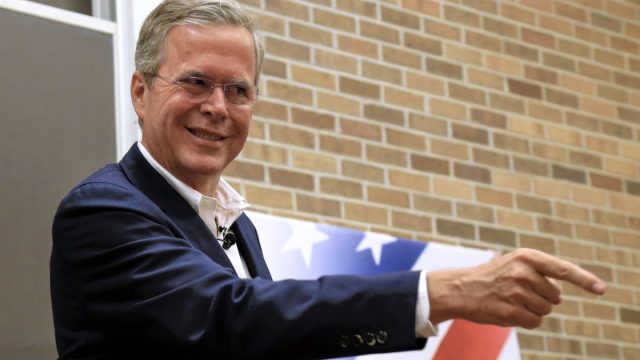Maybe Money Can't Buy Elections

Republican presidential candidate former Florida Gov. Jeb Bush points during a meet and greet event in Sioux City, Iowa, Monday, July 13, 2015. (AP Photo/Nati Harnik)
A rallying cry of the left in recent years has been the denunciation of money in politics. Particularly after the Supreme Court’s decision in Citizens United vs. FEC which found that political spending is 1st amendment protected free speech.
The right decision, I think. Why shouldn’t we be able to spend our money promoting the ideas and candidates we believe in, whether we do so as individuals or through an organization like a non-profit or for-profit corporation?
But the way the left tells it, that sort of liberty just means the rich and powerful will buy elections. Except, we got a lesson in just how untrue that is in Iowa last night.
Consider Jeb Bush. According to the Huffington Post he spent more, by far, than any other candidate in Iowa. In fact, he spent about $2,800 for every vote he received.
Bush spent 18 times more money in Iowa than first place winner Ted Cruz did. He spent 34 times more than second place Donald Trump, and 10 times more than third place Marco Rubio.
Money is important in politics, sure. It costs a lot of money to hire staff and buy advertising and pay for the basic campaign infrastructure which makes it possible for any given candidate’s message to reach the masses. But beyond a certain level there is a point of diminishing returns. Once you reach a level of campaign funding, what matters much more is the candidate and what he or she has to say and how voters feel about what the candidate has to say.
Which puts lie to this idea that treating political spending as speech is some affront to democracy.
It really isn’t. If it were true, Jeb Bush should have won Iowa by a landslide.
And it’s a lesson for North Dakota’s hotly-contested gubernatorial race. Certainly Attorney General Wayne Stenehjem’s big fundraising lead is a positive for his campaign. It shows a lot of buy-in from supporters at these early stages. But it hardly guarantees victory.
Stenehjem, like his competitors, still has to give the electorate something to vote for.




